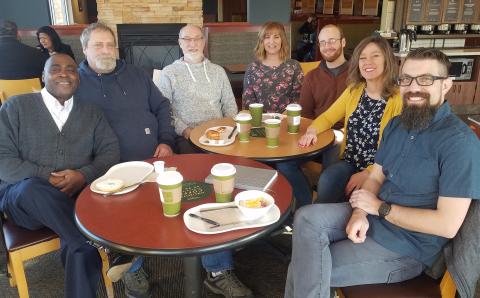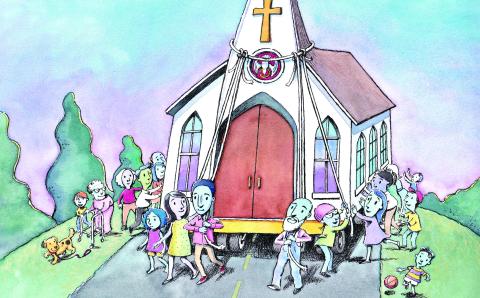Researchers have studied veterans from the war in Afghanistan who have had trouble readjusting upon returning home. Many face depression, substance abuse, or even thoughts of suicide. Often, when questioned, they express a desire to return to the war. But that’s not because they were fervent believers in war’s purpose. Instead, they missed deeply their belonging to their platoon.
Being bound together with others in a commitment so strong that one’s life could be sacrificed for another’s gave their lives a compelling purpose. Moreover, this came through participating in a shared mission together. Back in the United States, for those finding adjustment difficult, life seemed to offer nothing comparable. They missed and even longed for the bonds of their platoon in ways hard to rationally understand.
A yearning for community seems implanted deep within the human heart. Yet so much in modern society pushes us in the opposite direction. We worship individualism. Society is constructed as if “I” is at the center of everything. The bottom line is that my rights, my prerogatives, my desires, my fulfillment, and my wishes come first. Apps on social media often reinforce this. I’ve got “MyATT,” a health plan with “MyPres,” National Car Rental’s Emerald Club advertised as “The Power of Me,” and countless more.
A more serious philosophical foundation lies beneath all this. Since the Enlightenment, Western culture has been constructed around the rights of the individual. Political life, economic systems, and social arrangements begin with the primacy of the self. That’s where we start from, and we build from there. Without even realizing it, the assumed baseline for life in modern society is the trinity of “me, myself, and I.”
You might be wondering if all this is bad. Of course not. None of us would want to give up the liberating advances of political systems that threw off the tyranny of the divine right of kings. The movement for human rights around the world has opened space to free millions from oppression. We’ve witnessed the punishing effects of collectivist economic systems. And anyone studying psychology knows the essential need for pathways of self-actualization in the journey toward emotional maturity.
Yet life that places the self solely at the center ultimately becomes self-destructive. That’s a theological truth, but one also evidenced sociologically, politically, economically, and psychologically. We may not like to admit it, but many of our lives are bound by the heresy of individualism.
Biblical wisdom has a different starting point. God’s saving work always moves toward creating a faithful community of God’s people. The inspiring stories of the Old Testament are framed around calling, liberating, and leading the people of Israel as a covenant community. The fulcrum of God’s justice always falls on the side of shaping the shared life of a people whose hospitality and faithfulness reflect the covenantal love of God. It’s not about me; it’s about the “we.”
Jesus always called people not only to follow him, but to join with other disciples in doing so. On his last night with them before his crucifixion, he washed the feet of those closest to him, yearning for his love to bind them to one another. On the day of Pentecost, the outpouring of the Spirit came to create the community of God’s people as the body of Christ, the church. As the church’s emerging life is recorded in Acts and the epistles, this continuing story describes the work of God’s Spirit to form a community of those bound together as one in Christ’s love. Paul’s declaration in 1 Corinthians 12 that we are parts of one body and members of one another is as sharp a rebuke to the heresy of individualism that one can find.
Our contemporary congregations, whether in the Christian Reformed Church, the Reformed Church in America, or beyond, often don’t live that way. Implicitly, members assume the church is really all about their individual fulfillment. We talk about what one “got out of the sermon.” Church staff work feverishly to figure out how to meet the needs and expectations of individuals with special interests. When looking for a congregation to join, we commonly refer to the practice of “church shopping.” It becomes another consumer activity with the sole goal of self-gratification.
Obviously one expects that the grace of God, through the ministry and sacraments of a local congregation, should meet the needs of the human heart. One wants congregational life to be fulfilling. But such fulfillment should come primarily not through the satisfaction of isolated, individual needs but through the transformation of one’s life to share and give as a member of God’s community of people.
Early in our marriage, my wife, Kaarin, and I were part of efforts to form intentional Christian community. We longed for church shaped by the community described in Acts, where believers were deeply bonded to one another, as an alternative to the self-centered individualism sanctioned by secular society. But it was hard work, often subject to frailty and failure.
We searched for wisdom. One book helping those of us on this journey was Jean Vanier’s Community and Growth. Despite the recent disquieting reports about Vanier abusing staff members, his words made an impact then that still holds today. In a phrase I’ve never forgotten, Vanier says that in any church or Christian group, there must be more people who can say “me for the community” than those who say “the community for me.” In all the years since, and in all my experiences of local congregations and denominational structures, I’ve found this to ring true. When a majority of people put “me” at the center—their own prerogatives, judgments, and desires—the congregation or even the denomination will wither and eventually implode. The gospel calls us to a different way.
Christian faith is deeply personal. It draws the person into a saving, transforming relationship with God through Jesus Christ. But Christian faith is never individualistic. That’s where we’ve gotten confused. We’ve allowed society’s idolatry of the individual to infuse and distort our understanding of the gospel. Our personal relationship to God must be expressed and experienced through our belonging to God’s people. There can be no Robinson Crusoe Christians.
Furthermore, we can’t underestimate the insidious pressures of selfish individualism in our society. It seeks to shape our lives in so many ways. And those pressures can’t be resisted alone. It takes a community of brothers and sisters called by the transforming vision of life together as Christ’s body to nurture a spiritual journey toward freedom from the heresy of individualism.
This isn’t just a smart strategy. Rather, it puts us in touch with God’s nature, the heart of all reality. We’ve all been taught about the Trinity consisting of three separate persons, Father, Son, and Holy Spirit. But often we haven’t grasped the deeper truth that the Trinity is a holy community of relationships. Church fathers in the fourth century came up with a name for this: perichoresis. It comes from a term describing rotation, as in a circle dance, and means the indwelling of one person of the Trinity with another. Recent theologians like Jürgen Moltmann, Miroslav Volf, and many others have built on this truth. Simply put, the Trinity is a community of mutual love, resting at the heart of all reality and inviting us into its life.
Early in my career I was part of Church of the Saviour in Washington, D.C. No church has had a greater impact on my life. Begun by Gordon and Mary Cosby shortly after World War II, this church placed a radical commitment to community and mission at the heart of its life. The church was structured entirely around small “mission groups.” Each was based on an outward call shared by those choosing to join, such as health care and healing for the poor, shelter for the homeless, outreach and hospitality through a coffee house, a retreat center ministry, and many more.
Each mission group, however, was also the place of accountability and nurture for the members’ inward spiritual lives. This included agreed-to disciplines such as Bible reading, prayer, journal writing, and similar practices for 50 minutes every day. Thus mission groups became the heart of the church, where one’s inward journey with Christ and one’s outward journey to join in God’s mission were intrinsically linked. One could only join the church as an intern member, and then a full member, through belonging to a mission group.
Theologically, this meant that koinonia, the fellowship of brothers and sisters in Christ, and diakonia, the service to the needs of others, were bound together for each member of this church. With the church I deepened my inward journey, learning how to dwell in God’s love as I engaged in my outward journey of striving to work for God’s peace, justice, and generous hospitality. My gifts, nurtured through the life of my mission group, were deeply valued but were not held individually, for my own sake. This was an experience of “me for the community” rather than a church that simply sanctioned the rampant individualism of the culture.
The past 50 years have witnessed the rise of the small-group movement within U.S. congregations. Most churches now offer various small fellowship groups to render support and nurture for one another. This is a welcome trend. Yet my concern is that most of these groups are based only on koinonia. They easily can turn inward and become self-absorbed. I’ve never forgotten the imperative of linking together our inward and outward journeys of faith at every level of Christian life. If congregations are to be the antidote to the heresy of individualism, that model offers a way forward.
A secular example might help. In 2008, Doc Rivers was the coach of the Boston Celtics basketball team. He worried about how to work with a group of superstars and get them to play not as individuals, but as a team. Rivers had heard about Desmond Tutu, the Nobel Prize-winning Anglican archbishop from South Africa. Tutu often talked about ubuntu, an African philosophy meaning one could only be a person through one’s relationship with others, bound intrinsically in community. Put simply, “I am because we are.” Tutu liked to apply this to the church and to society.
Rivers, however, wanted to apply this to his team. Before the season started, Rivers read collections of Tutu’s sermons. At the first team meeting, Rivers began simply by sharing the word ubuntu. On a preseason trip to Rome, the team nurtured ubuntu’s meaning and qualities. When the season was underway, they broke their team huddles chanting Ubuntu!—and then they played that way. That year the Celtics won the league championship. Ubuntu is inscribed on their championship rings.
How much more should the church live as such a community! We are not to find our meaning as solitary individuals. None of the best-selling self-help books will change that. For the Christian, striving to be an individual superstar gets in the way of the church’s life and mission. We’re meant to live as one. Together is better. And that togetherness is not for its own sake, but for the purpose of joining God’s mission in the world.
Sometimes we are tempted to just stay in the huddle. The fellowship, support, and comfort really feel good. The late John Hesselink, professor of theology at Western Theological Seminary, once told me a story. He was a tackle on a football team in Iowa, facing a tough foe. The opposing line was winning the battle in the trenches, decisively. Hesselink’s battered team gathered back in the huddle after a play, and one teammate said, “Couldn’t we just stay here?” But the church lives to break the huddle. We are gathered, nurtured into a community, and then sent to join God’s mission in the world. The Boston Celtics didn’t chant ubuntu when they came into the huddle, but when they returned to the court.
Many in the church today are worried about various heresies. Usually this relates to conflicting theological interpretations of Scripture or departures from the church’s confessions. Those discussions have their place. But I’m more worried about the heresies we don’t commonly recognize. Chief among them is the heresy of individualism, and its pernicious effects on our lives and in our churches.
Those soldiers returning from Afghanistan who had difficulties adjusting to civilian life missed the community of their platoon. Individualism was overcome in an experience of being bonded together with others in life and death. They shared a common mission that gave them a sense of purpose and meaning. But for those soldiers, of course, their mission was carried out in the violence of a brutal war.
What would our congregations look like if we learned to overcome the individualism so ingrained in our culture? What if we lived by the words we say we believe: “Just as the body, though one, has many parts, but all its many parts form one body, so it is with Christ” (1 Cor. 12:12)? And what if we then lived and worked together in the common mission of extending God’s peace, justice, and saving love into the world?
Discussion Questions
- What other examples of the “I” being the center of everything in our society can you name?
- How else has individualism affected our understanding and practice of Christianity?
- What are some church practices that help mitigate our culture’s individualism?
- How well is your local church community balancing koinonia and diakonia?
About the Author
Wes Granberg-Michaelson served as general secretary of the Reformed Church in America from 1994 to 2011. He’s the author of eight books, including Future Faith: Ten Challenges Reshaping Christianity in the 21st Century (Fortress) and most recently How Change Comes to Your Church (Eerdmans). He and his wife now live in Santa Fe, N. Mex.









